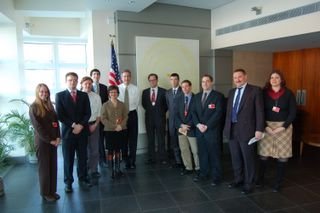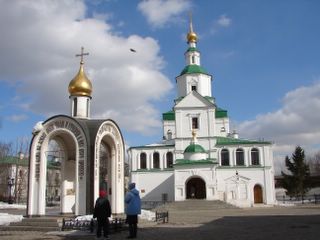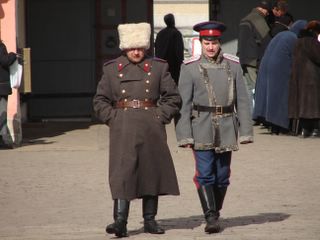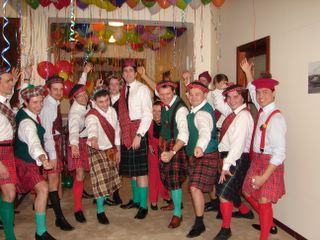The New Ambassador
On Monday, the Alfa Fellowship Group was invited to meet with the US ambassador to the Russian Federation.
The Embassy is a large compound in central Moscow, right on the Garden ring - a major thouroughfare. Its a collection of all sorts of types of buildings - an older, 1950's style monster, modern townhouses, and a very modern office complex that houses most of the administrative functions.
Security, of course, is pretty tight. First, a visitor has to present his documents to the Russian policeman on the street. Then, entering the security checkpoint, to a man behind bulletproof glass to be admitted into the screening area - where your visit must be pre-logged on the computer system. Leave your passport with the security desk in exchange for a visitors badge, then on through the metal detectors and camera confiscation point, and that includes camera phones, too.
It was all very efficient and polite, but nonetheless strange. All the staff wore baseball hats and short ski jackets emblazoned with US flags and State Department seals. But they were all Russian. In fact, our American escort at the door went over to the security desk and asked a question in russian assuming that everyone there was a local employee. The guy looked up, pressed the microphone button, and said "You're gonna have to speak English."
Once inside the checkpoint, we were technically on US soil. The sun shone a little more brightly, the air smelled just a bit sweeter. Sure, these things were only in my head; but I may very literally have been walking on US soil - a favorite story in the US expat community is how all the grass for the embassy compound was imported from back home.
In the administrative headquarters (where security is run, unobtrusively, by Marines), we met the ambassador in a winter garden porch at the end of a hallway lined with Warhols, at the top of a staircase surrounded by Tihany glass. In all, a nice environment for a chat.
Ambassador Burns is fluent in russian, having been posted here in the 1990s, and a career diplomat at the state department. He was, however, a bit more open and candid than I would have expected for someone with that background. He didn't say anything wildly inflammatory of course, but he was quite honest.
Naturally, the conversation was a little bit of preaching to the choir. He talked about his efforts to convince people in Washington that Russia is still a critically relevant country to the US. We, of course, by virtue of sitting in Moscow apparently already believe that.
I asked about the "country risk premium" that the capital markets attach to Russian securities and asked if he saw a linkage between that and political tensions between the governments. If so, I continued, is it fair to do so and how can it be counteracted? Ambassador Burns talked about being consistent in the application of rules. Investors don't have to agree with all the rules, but they're generally willing to put up with them if they're laid out and clearly detailed.
Good answer, and experience in various markets around the world probably proves him right. It seems to me, however, that there's just a little something more to it. American investors and corporations plow vast sums into unreformed communist regimes (China) where the rules change daily, and yet they freeze up when they hear the word "Russia". Sure, foreign direct investment is surging here, but its still somewhere around the central African nation level. And the American share of that total is pitifully small.
Most of our corporations see the light just shortly before dusk. The real glory of American business is that it has deep pockets and can barge its way into even developed markets by acquiring market share at nearly any cost. Three cheers for foresight.
Anyway, here's a photo of the Alfa Group (and a couple of Alfa administrators) with The Honorable William Burns, United States Ambassador to the Russian Federation.

Alfa Fellows with US Ambassador Burns








